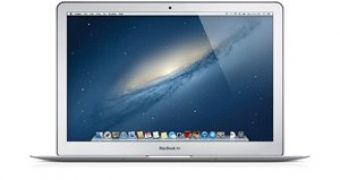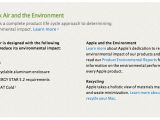The Electronic Product Environmental Assessment Tool, or EPEAT, has released the results of a verification process that tested five “ultra-thin” notebooks, including the MacBook Air, to assess whether or not they conformed with the groups’ environmental requirements
Earlier this year, Apple removed its products from the EPEAT rating system, attracting scrutiny from the public.
Soon afterwards, the company’s senior vice president of hardware engineering recognized that this move was a mistake and, on July 13, 2012, all eligible Apple products were back on EPEAT.
Among those products was the MacBook Air, which the EPEAT investigated in this verification process and confirmed that it “met the requirements of the criteria reviewed.” Products from Lenovo, Samsung and Toshiba were also tested.
The group undertook fundamental inquiries, in order to ensure the integrity of the registry, such as a request for formal clarification of the standard requirements from the independent Product Verification Committee (PVC).
The PVC is “a group of experts on electronics and environmental issues who provide interpretation of conformity requirements and rule on verification findings,” according to the description offered by the government-backed organization.
Another inquiry involved a deep review of technical information for notebook products in the EPEAT registry, while another looked at public information that failed to resolve questions of potential nonconformance.
“Following their disassembly investigation, the test lab recommended that all the products be found to satisfy EPEAT requirements,” the group said.
“After reviewing the data and recommendations provided by the lab, the PVC found all investigated products to be in conformance with EPEAT criteria, clearing the way for all the products investigated to remain on the EPEAT registry,” the organization concluded.
Robert Frisbee, CEO of EPEAT said, “EPEAT is committed to foster greener electronics and to give purchasers the tools to evaluate green claims.”
“The system’s rigorous environmental assessment processes result from a powerful stakeholder collaboration that includes purchasers, environmental advocates, government, manufacturer, recycler and academic participants. This latest series of stringent investigations demonstrates the power of that approach,” added Frisbee.

 14 DAY TRIAL //
14 DAY TRIAL // 
